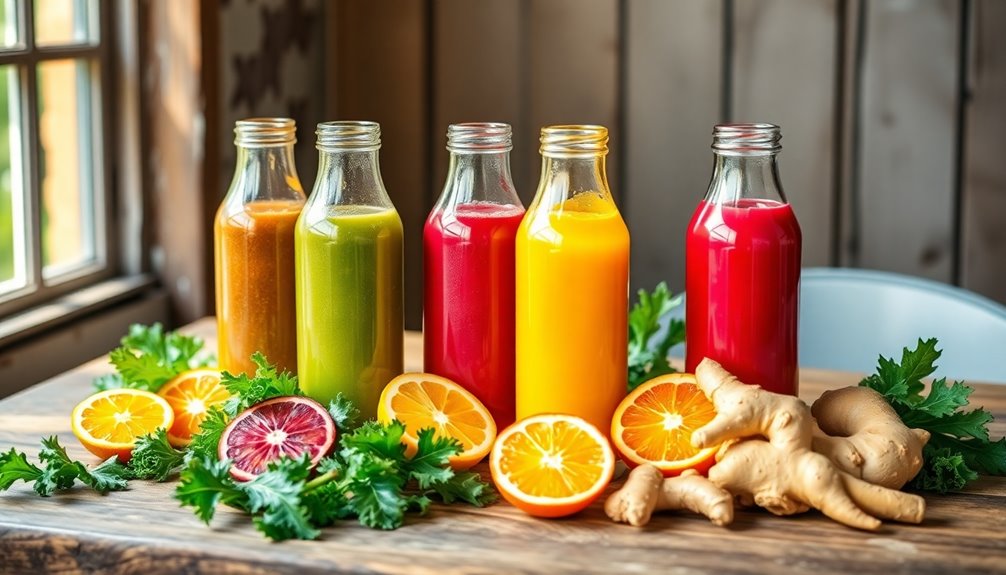Detox diets, like juice cleanses, focus on eliminating toxins through structured eating plans. They typically emphasize whole foods, fruits, and vegetables, and may include supplements for additional nutrients. You could experience benefits like improved digestion, increased energy, and clearer skin. However, it's important to be cautious, as potential risks include nutritional deficiencies and dehydration. Always consider your health status and consult a healthcare professional if needed, especially if you have existing conditions. Approaching detoxing mindfully can maximize its benefits while minimizing risks. To understand more about effective strategies and options, you might want to explore further.
Key Takeaways
- Detox diets focus on eliminating toxins through structured eating plans rich in whole foods, fruits, and vegetables.
- Juice cleanses and detox teas are popular methods for detoxification, providing nutrients while promoting hydration.
- Benefits of detox diets include improved digestion, increased energy levels, clearer skin, and potential weight loss.
- Risks involve nutritional deficiencies, dehydration, and the need for medical supervision if you have existing health conditions or are pregnant.
- A well-structured detox program can enhance overall health by encouraging better eating habits and providing essential vitamins and minerals.
What Are Detox Diets?
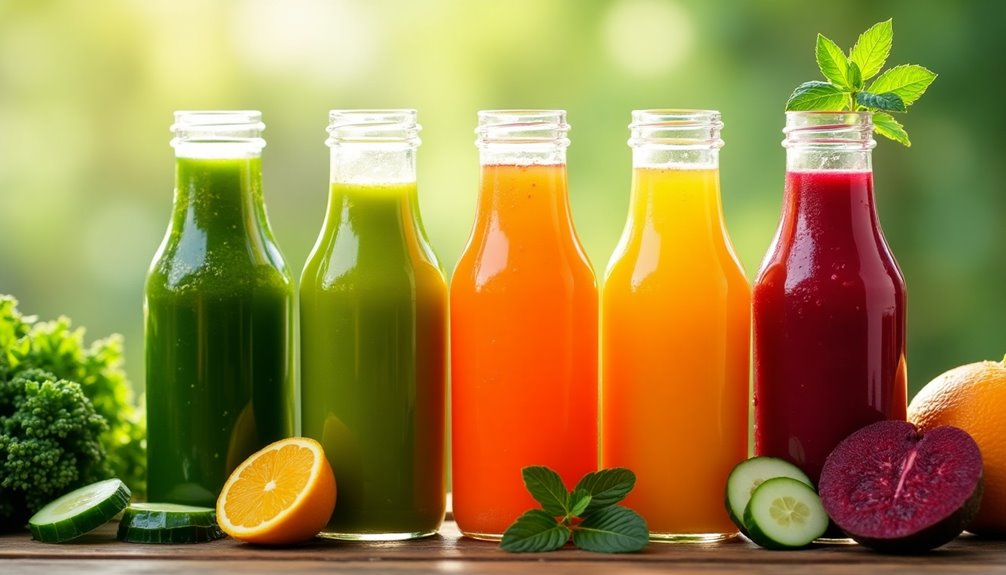
Detox diets, often promoted as a quick fix for enhanced health, involve structured eating plans designed to eliminate toxins from your body. Typically, these diets emphasize whole foods, fruits, vegetables, and sometimes supplements, aiming to support your body's detoxifying process. While many people seek these diets for their potential benefits, it's crucial to approach them with a balanced perspective.
You might find that detox diets can encourage better eating habits and a greater awareness of nutritional balance. By focusing on nutrient-rich foods, you're likely to consume more vitamins and minerals, which are fundamental for overall health. However, it's important to recognize that the body is naturally equipped to detoxify itself through the liver, kidneys, and other organs.
Many proponents of detox diets argue that reducing processed foods and sugar can help enhance your vitality and energy levels. Yet, this doesn't mean you need to completely eliminate food groups or drastically restrict calories. Instead, consider incorporating more whole foods into your daily routine, which can lead to sustainable health improvements without the need for extreme measures. Additionally, incorporating mini band workouts can provide a practical way to enhance your fitness routine while detoxifying your body.
Ultimately, while detox diets can provide a temporary reset, fostering a long-term relationship with balanced nutrition is essential. Rather than viewing detoxification as a one-time event, think of it as an ongoing commitment to your health, allowing you to feel more connected to your body and its needs. Embracing this mindset can help you achieve lasting wellness and a sense of belonging in your health journey.
Popular Types of Detox Diets
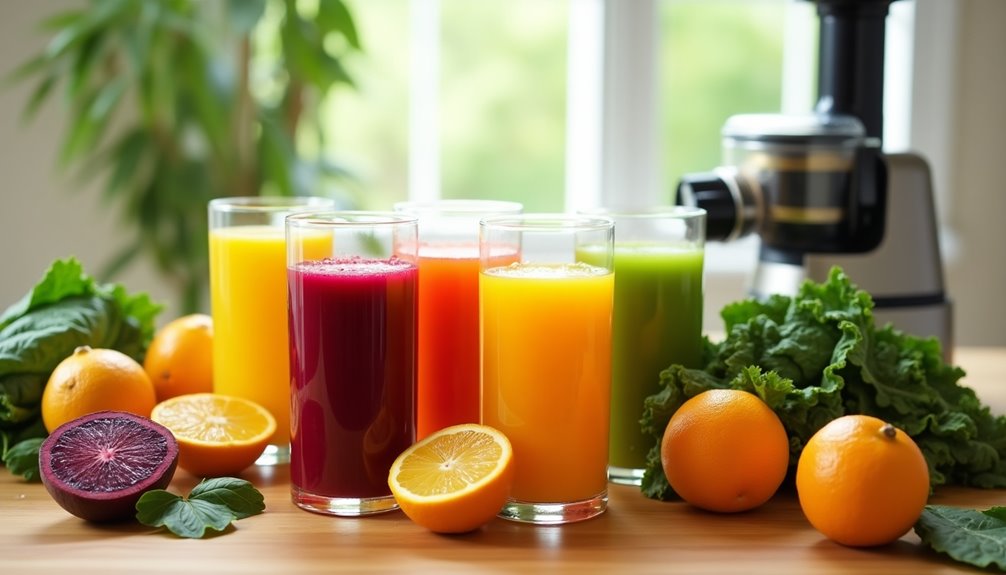
When exploring the world of detox diets, you'll come across several popular types that cater to different preferences and health goals. One of the most well-known options is juice cleanses. These typically involve consuming only fruit and vegetable juices for a specific period, often ranging from a few days to a week. Proponents claim juice cleanses can boost energy and improve overall health. However, the effectiveness of these cleanses is debated among nutritionists, as they may lack important nutrients and protein. Additionally, incorporating plant-based protein into your detox plan can help ensure you're meeting essential nutrient needs.
Another popular choice is detox teas. These beverages often contain a blend of herbs, and while many people enjoy them for their potential detoxifying properties, it's important to be aware of the possible side effects. Some detox teas can cause digestive issues, dehydration, or even reliance on laxatives, so it's crucial to choose products wisely and consult with a healthcare professional if you have concerns.
You might also encounter meal replacement detox diets, where specific meals are substituted with shakes or bars designed to provide necessary nutrients. While these can be convenient, it's essential to make sure you're still receiving a balanced diet.
Ultimately, the right detox diet for you depends on your lifestyle and health goals. Always approach detoxing with caution and seek guidance from professionals to make sure you're making safe and informed choices.
Potential Benefits of Detoxing
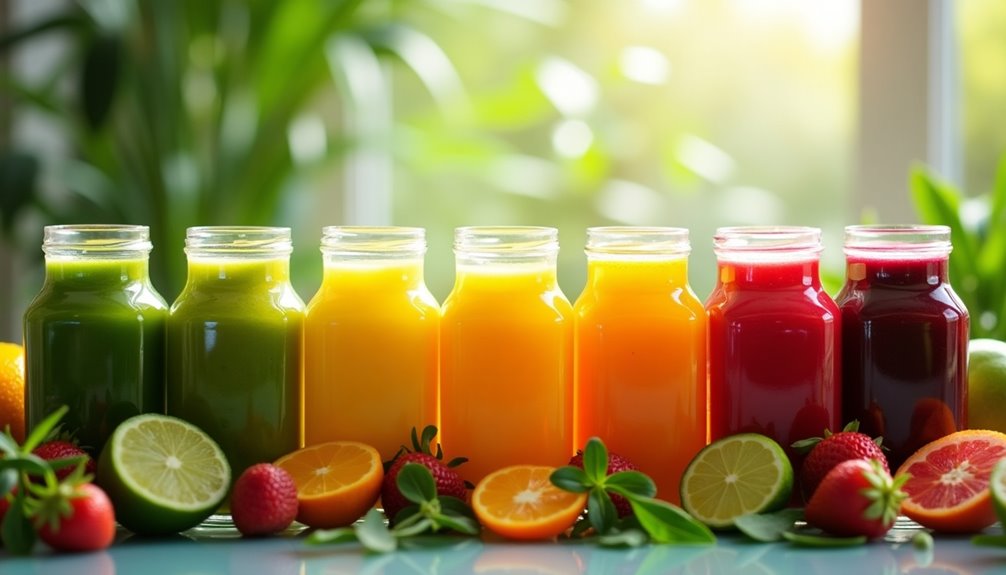
While the concept of detoxing often raises skepticism, many individuals report various potential benefits after following a detox diet. If you're considering trying a detox, understanding these benefits can help you make an informed choice. Here are some commonly reported advantages:
- Improved Digestion: Many people find that a detox diet helps reset their digestive system. By eliminating processed foods and focusing on whole, nutrient-dense options, you may experience less bloating and discomfort.
- Boosted Energy: After a detox, many individuals report feeling more energetic. This boost can stem from consuming fresh fruits and vegetables, which provide essential vitamins and minerals that support overall health.
- Clearer Skin: If you've struggled with skin issues, detoxing may help. By removing toxins and inflammatory foods, some people notice a reduction in breakouts and an overall improvement in skin appearance.
- Weight Loss: While not the primary goal for everyone, many individuals experience weight loss during a detox. By cutting out high-calorie, low-nutrient foods, you might find it easier to shed some pounds, especially if you maintain healthy habits afterward. Additionally, a plant-based diet is rich in antioxidants and fiber that can further enhance your detox experience and promote overall health.
Risks and Considerations
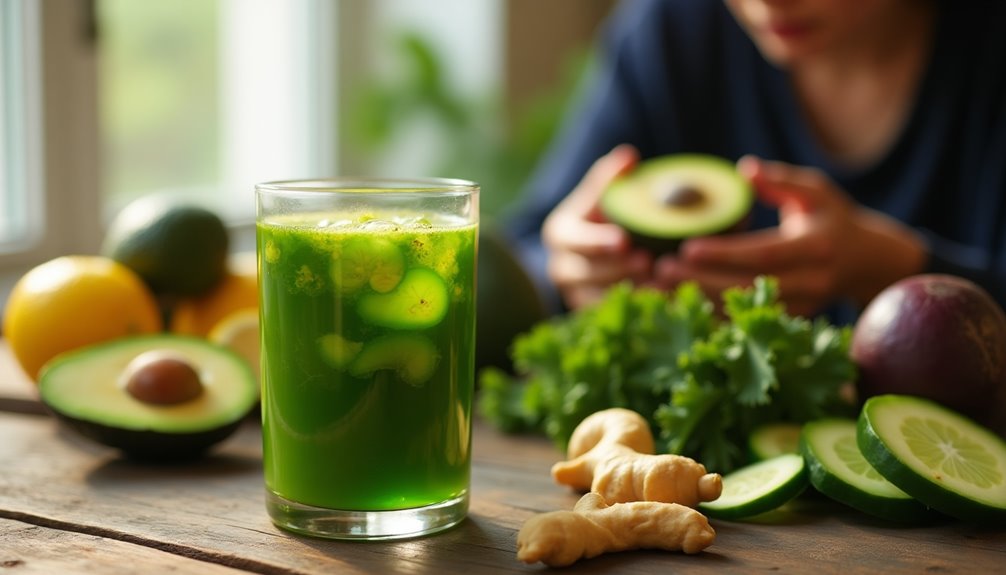
Exploring the potential risks and aspects of detox diets is necessary before starting one. While many people seek these diets for quick weight loss or enhanced energy, it's important to acknowledge the possible downsides. One of the most significant risks is nutritional deficiencies. Many detox diets, particularly juice cleanses, often lack necessary nutrients, which can lead to fatigue, weakened immunity, and long-term health issues.
You might feel tempted by the idea of a quick cleanse, but without a balanced intake of vitamins and minerals, your body can suffer. It's also crucial to note that detox diets can lead to rapid weight loss, which often results in muscle loss rather than fat loss. This isn't a sustainable or healthy approach to weight management.
Moreover, seeking medical supervision is essential, especially if you have existing health conditions or are pregnant. A healthcare professional can help you understand the implications of detoxing and monitor any adverse effects you might experience. Relying on unregulated detox methods can pose serious health risks, including dehydration and electrolyte imbalances.
Additionally, research shows that a well-structured diet program can provide benefits such as enhancing metabolism and supporting overall health without the risks associated with extreme detox methods.
Ultimately, while detox diets may seem appealing, it's vital to weigh the potential benefits against these risks. Always prioritize your health by making informed choices and exploring a more balanced approach to nutrition. Your body deserves the best, and understanding these risks is an important step in nurturing it.
How to Approach Detox Dieting
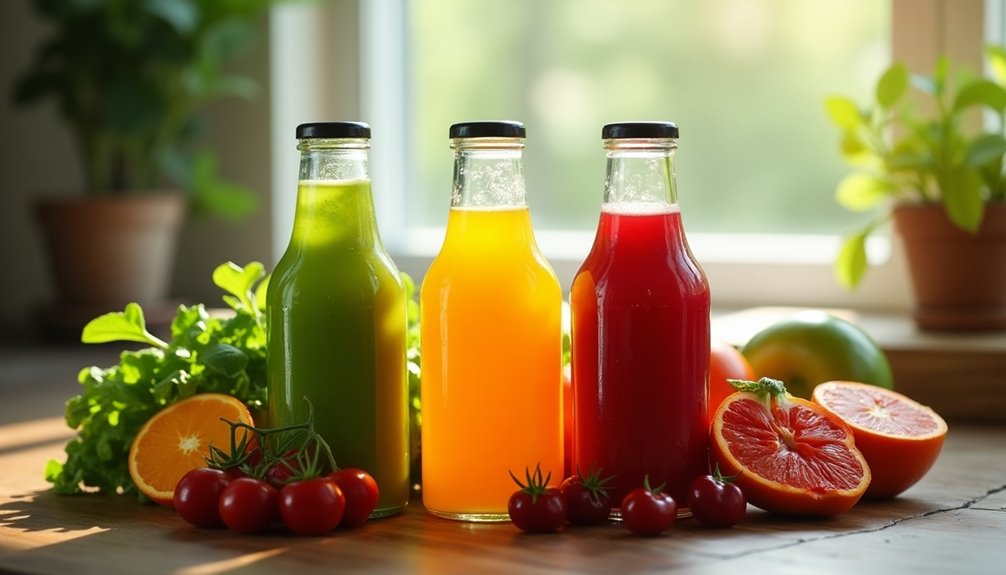
Approaching detox dieting necessitates a thoughtful strategy that prioritizes your overall health and well-being. It's paramount to remember that detox diets aren't a one-size-fits-all solution. Instead, focus on methods that promote mindful eating and balanced nutrition. Here's how you can get started:
- Set Clear Goals: Determine what you hope to achieve through detox dieting. Whether it's improved digestion, increased energy, or weight loss, having clear goals helps you stay focused.
- Embrace Mindful Eating: Pay attention to what you're eating and how it makes you feel. Chew slowly, savor each bite, and listen to your body's hunger cues. This practice not only enhances your relationship with food but also aids in digestion.
- Choose Nutrient-Dense Foods: Rather than restricting your diet, focus on incorporating whole, nutrient-rich foods. Fruits, vegetables, whole grains, and lean proteins can help you achieve balanced nutrition while supporting your detox goals.
- Stay Hydrated: Drinking enough water is essential during any detox. Hydration helps your body eliminate toxins more effectively and keeps your energy levels up. Additionally, consider utilizing progress tracking tools to monitor your detox journey and stay motivated.
Frequently Asked Questions
Can Detox Diets Help With Weight Loss Long-Term?
When considering weight loss, you've got to think about sustainability concerns. Many quick-fix diets can lead to short-term results, but they often fail to support lasting change. The metabolic effects of these diets can be tricky; they might slow your metabolism over time.
Instead, focus on balanced eating and regular exercise. This approach not only promotes healthy weight loss but also nurtures a sustainable lifestyle that fosters long-term well-being.
Are There Age Restrictions for Detox Diets?
You might think age is just a number when it comes to diets, but it's not that simple. Child safety is essential; young bodies need balanced nutrition to grow.
Conversely, elderly concerns arise as older adults often have specific health conditions that require careful dietary management.
While there aren't strict age restrictions, consulting a healthcare professional is vital for everyone to guarantee safety and effectiveness tailored to individual needs, promoting a sense of belonging in health communities.
What Should I Do Post-Detox for Best Results?
After completing your detox, focus on meal planning to maintain your progress. Incorporate whole foods like fruits, vegetables, lean proteins, and whole grains into your meals. It's also essential to establish a consistent exercise routine, blending cardio and strength training for overall health. Stay hydrated and listen to your body's needs. Connecting with supportive communities can help you stay motivated and share your journey, ensuring you feel supported in your wellness goals.
How Often Can I Safely Do a Detox Diet?
Think of your body as a garden; it needs time to flourish between detoxes. For safety and effectiveness, aim for a detox frequency of once every few months. This allows your body to recover and maintain balance, ensuring the longevity of your results.
Overdoing it can lead to nutrient deficiencies and stress. Listen to your body's signals and consult a healthcare professional to find the right rhythm for your unique needs.
Can Detox Diets Cleanse Medications From the Body?
You might wonder if detox diets can cleanse medications from your body. While these diets can promote detox effectiveness for some substances, they don't typically target medications.
Medication interactions can happen, but they're complex and depend on various factors like your health and the specific medications.
It's crucial to consult a healthcare professional before starting any detox plan, ensuring it aligns with your overall wellness and doesn't interfere with your prescribed treatments.
Conclusion
To sum up, while detox diets can offer some benefits, like a short-term reset or increased awareness of your eating habits, they're not a one-size-fits-all solution. Have you considered how sustainable these practices are in the long run? It is crucial to weigh the potential risks against any benefits and approach detoxing with caution. Instead of extreme diets, focusing on balanced nutrition and healthy habits may be a more effective way to support your body's natural detoxification processes.

